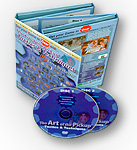 When I was still in college, I used to work at a print shop. We did all kinds of printing copying and finishing. My friend who worked there (the first guy I ever knew who had actual, real, game with women) always gave me gold nuggets of advice that I never realized were gold until years later.
When I was still in college, I used to work at a print shop. We did all kinds of printing copying and finishing. My friend who worked there (the first guy I ever knew who had actual, real, game with women) always gave me gold nuggets of advice that I never realized were gold until years later.
Anyway, at this place just about everything we did involved repetition. Printing, collating, cutting, folding, binding, packing. Even the things that didn’t seem to have a repetition were repetitive in the sense that we did them many times for different jobs and customers. Layout, plate-making, repairing and cleaning machines, shipping.
My friend would always have a competition, against himself, to find any angle possible to do any given task faster, more efficient, and better. There were even times I would find a way to beat his performance, only to find he found yet another way to do something faster and more efficient.
I didn’t find this discouraging at all, it was inspiring, and I found such challenges made the job more enjoyable than it already was (call me crazy, I liked running a printing press). What I learned from that was a certain life-improving discipline which I’ll share with you now.
This performance-chasing friend would tell me “repetition builds speed and accuracy”.
He was right. I don’t think he looked any deeper than the cause and effect, but the curious person I am I tend to want to know why such a simple pragmatism never fails. To understand it is to own it.
It’s not that repetition builds some kind of physical change, unless you’re talking about working out or nutrition or the landscape being carved by water over millions of years. What repetition does, when it comes to actions and behavior, is build a “memory”, but not a memory of an event, rather a memory of a path. Like walking a trail so often that you eventually create a visible path to follow where you can let go of the memory altogether and what remains is the equivalent of instinct.
Ants do this.
Have you ever watched how ants forage? They have a colony and it seems when the ants begin to investigate the terrain, they crawl around almost randomly but then eventually they make a trail that all of them follow to and from a source of food.
How do they know which way to go?
What they do is, when they are initially foraging for food, they crawl around randomly until they find something. Then, on their way back to the colony, the leave a scent trail using pheromones. After time, when multiple ants do this, the pheromone trail back to the colony becomes stronger and stronger, to the point where ants leaving the colony and going to the food can easily follow the most direct trail available to the food, even without any other ants to follow.
How does this help you?
It helps you to understand and appreciate the value of repetition. Repetition garners familiarity and with familiarity comes inherent confidence. When you are familiar with something, you are more confident in it. When you are familiar with something, you are more skillful. You are quicker on your feet. You have more predictable results.
Once you build enough repetition and familiarity in something, the path has been paved so solidly that you become inherently competent, your instincts are finely tuned, and you can easily trust yourself to get the outcome you want without it feeling hard to do.
But to get there, you need to pound down the path. You need to utilize the tool of experience to get to the point of what can be called a natural instinct. If you didn’t understand this before, you understand it now and the next gold nugget I will give you is to realize that you are like an ant in a colony and the experiences of others are like the pheremone trails building up.
For example, when we give you a tactic, technique, or routine, on this blog or in the almost-released “Tactics & Techniques”, we are giving you tried-and-tested piece of game that you can use and repeat enough times that eventually, put altogether, allows you to build an instinct for pickup. Each individual piece of material, no matter how much we break it down, won’t be a magic bullet by itself to get you there, but the combination of it all, and put into practice with repetition WILL get you there.
So, let go of the conflict between “direct game” or “indirect” game, “inner game” versus “outer game”, natural versus dynamic, eventually it will all be natural and dynamic for you. But you can’t get there without the ant trails. You can’t forage for success by blindly going in all directions without building those trails.


 (4 votes, average: 3.25 out of 5)
(4 votes, average: 3.25 out of 5)





Leave a Reply